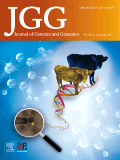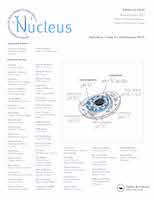
Epigenetics & Chromatin
Scope & Guideline
Exploring the Depths of Gene Regulation
Introduction
Aims and Scopes
- Epigenetic Regulation Mechanisms:
The journal focuses on elucidating the complex mechanisms of epigenetic regulation, including DNA methylation, histone modifications, and chromatin remodeling, which are crucial for gene expression and cellular identity. - Chromatin Structure and Dynamics:
Research published in the journal often investigates the organization and dynamics of chromatin, including the roles of chromatin-associated proteins, nuclear architecture, and higher-order chromatin structures in regulating genetic information. - Disease Associations and Therapeutics:
There is a consistent emphasis on the links between epigenetic alterations and various diseases, particularly cancer. The journal encourages studies that explore therapeutic interventions targeting epigenetic modifications. - Model Organisms and Systems Biology:
The journal includes studies using diverse model organisms ranging from yeast and zebrafish to mammals, reflecting a broad interest in how epigenetic principles apply across species and their relevance to human health. - Technological Advancements in Epigenomics:
The journal highlights innovative methodologies and technologies in epigenomics, such as CRISPR-based epigenome editing, high-resolution chromatin profiling, and single-cell analyses, contributing to the advancement of the field.
Trending and Emerging
- Environmental Epigenetics:
There is a growing interest in how environmental factors, such as pollutants and dietary components, influence epigenetic modifications and contribute to disease risk, marking a significant trend towards understanding the interplay between environment and epigenetics. - Epigenetic Editing Technologies:
Research on novel epigenetic editing technologies, including CRISPR-based approaches, has surged, emphasizing their potential for therapeutic applications and functional studies of epigenetic regulation. - Longitudinal and Developmental Studies:
Emerging studies focus on the epigenetic landscape during development and aging, exploring how epigenetic changes over time influence health outcomes and disease susceptibility, particularly in the context of early-life exposures. - Integration of Multi-Omics Approaches:
The trend towards integrating multi-omics techniques, such as combining epigenomics with transcriptomics and proteomics, is evident, providing a comprehensive understanding of cellular processes and disease mechanisms. - Role of Non-Coding RNAs in Epigenetic Regulation:
There is an increasing exploration of the role of non-coding RNAs in modulating epigenetic landscapes, highlighting their significance in gene regulation and potential therapeutic targets.
Declining or Waning
- Basic Biochemical Mechanisms of Epigenetic Enzymes:
Research that solely focuses on the biochemical characterization of epigenetic enzymes has decreased, as the journal now favors studies that integrate these mechanisms into broader biological contexts and disease implications. - Historical Perspectives on Epigenetics:
Papers that provide historical analyses or reviews of epigenetic concepts have become less frequent, suggesting a shift towards more contemporary research that addresses current challenges and innovations in the field. - Single Aspects of Epigenetic Regulation:
There is a noticeable reduction in studies examining single aspects of epigenetic regulation in isolation, such as individual histone modifications without consideration of their interactions or comprehensive effects on gene regulation. - General Surveys of Epigenetic Phenomena:
The journal has moved away from general surveys or overviews of epigenetic phenomena, favoring detailed, hypothesis-driven research that provides novel insights and data.
Similar Journals

FEBS LETTERS
Fostering Knowledge Exchange in Life SciencesFEBS LETTERS, published by Wiley, is a prestigious journal that has firmly established its place in the fields of biochemistry, biophysics, genetics, molecular biology, cell biology, and structural biology. With an esteemed history dating back to 1968, this journal continues to be a vital resource for researchers and professionals involved in the biological sciences. It boasts impressive quartile rankings, including Q1 statuses in several categories such as Biochemistry and Genetics, reflecting its high impact factor and significant contribution to scientific discourse. FEBS LETTERS provides a platform for innovative findings and critical reviews, fostering the exchange of knowledge and ideas within the scientific community. Although it operates under a subscription model, the journal ensures broad dissemination of groundbreaking research through its rigorous peer-review process. The vibrant discussions encouraged by articles published in FEBS LETTERS aim to inspire current and future generations of scientists to push the boundaries of biological understanding, making it an indispensable resource for anyone dedicated to advancing their knowledge in these dynamic fields.

Journal of Genetics and Genomics
Unraveling the Complexities of Genomic ScienceThe Journal of Genetics and Genomics, published by SCIENCE PRESS in China, stands as a significant contributor to the fields of Genetics and Molecular Biology. With an ISSN of 1673-8527 and E-ISSN 1873-5533, this esteemed journal has achieved a remarkable reputation, holding a prestigious Q1 ranking in both Genetics and Molecular Biology as of 2023. This journal not only showcases pioneering research but also fosters vital discussions on contemporary challenges and innovations within genomic sciences. As part of its commitment to facilitating scientific advancement, the journal encompasses a range of research articles, reviews, and short communications, all aiming to illuminate the complexities of genetic structures and functions from 2007 to 2024. Researchers, professionals, and students alike are encouraged to engage with its content, which ranks favorably in Scopus—placing it within the top tier of its categories. Join the community of academic excellence and explore the latest findings that shape our understanding of genomics.

CURRENT OPINION IN GENETICS & DEVELOPMENT
Uncovering the latest trends in genetics.CURRENT OPINION IN GENETICS & DEVELOPMENT is a prestigious journal published by CURRENT BIOLOGY LTD that offers an insightful platform for the latest developments and emerging trends in the fields of genetics and developmental biology. Established in 1991 and set to continue until at least 2024, this journal achieves notable recognition in the academic community with a Q1 classification in both its major categories as of 2023. With a Scopus rank placing it within the top quartile for both genetics and developmental biology, it serves as an essential resource for researchers, professionals, and students seeking to enhance their understanding of genetic mechanisms and developmental processes. While currently not an open-access journal, readers can explore the collection of high-quality articles that contribute to shaping contemporary scientific discourse and fostering innovation within these dynamic fields. For those dedicated to advancing their research and knowledge, CURRENT OPINION IN GENETICS & DEVELOPMENT stands as a vital and influential academic publication.

CHROMOSOMA
Shaping the Future of Genetics, One Study at a TimeCHROMOSOMA is a prestigious journal dedicated to advancing the field of genetics, published by Springer in Germany. With an ISSN of 0009-5915 and an E-ISSN of 1432-0886, this journal has been a cornerstone in the publishing landscape since its inception in 1939, serving as a critical resource for researchers and professionals interested in the intricacies of chromosomal biology. Although it operates on a subscription basis, the journal's rigorous peer-review process ensures the dissemination of high-quality research findings. With a commendable Q2 ranking in both genetic and clinical genetics categories as of 2023, CHROMOSOMA aims to bridge theoretical concepts with practical applications in medicine and biology. Researchers will appreciate its relevance, as indicated by its Scopus ranks and integration of diverse topics ranging from molecular genetics to clinical implications. By fostering collaboration and knowledge-sharing among scholars, CHROMOSOMA continues to shape the future of genetic research.

CURRENT OPINION IN CELL BIOLOGY
Advancing Insights in Cellular MechanismsCURRENT OPINION IN CELL BIOLOGY, published by CURRENT BIOLOGY LTD, serves as a vital resource for scholars and professionals in the dynamic field of cell biology. With a solid Q1 ranking and impressive Scopus ranking of #33 out of 285 in the category of Cell Biology, this journal is recognized for its high impact and relevance among its peers, boasting an excellent percentile ranking of 88th. Established in 1989, it provides insightful reviews and perspectives that capture the latest developments and emergent trends in cellular research, making it indispensable for those aiming to deepen their understanding of cellular mechanisms and innovations. While the journal does not offer open access, its carefully curated content ensures that subscribers receive top-tier scholarly discourse. Situated in the heart of the United Kingdom, CURRENT OPINION IN CELL BIOLOGY continues to shape the conversation in a field that is critical to advancements in biochemistry, genetics, and molecular biology.

CELLULAR & MOLECULAR BIOLOGY LETTERS
Connecting Ideas, Inspiring Innovations in Molecular BiologyCELLULAR & MOLECULAR BIOLOGY LETTERS, published by BMC, is a premier open-access journal dedicated to disseminating high-quality research in the fields of Biochemistry, Cell Biology, and Molecular Biology. Established in 1996, the journal has emerged as a leader in its domain, boasting an impressive Q1 ranking across three critical categories as of 2023, reflecting its significant impact within the scientific community. With an ISSN of 1425-8153 and an E-ISSN of 1689-1392, it offers accessible research findings to a global audience, having been open access since 2013. Situated in the United Kingdom, at CAMPUS, 4 CRINAN ST, LONDON N1 9XW, the journal continues to serve as a vital resource for researchers, professionals, and students, contributing to advancements in the understanding of cellular and molecular processes. By providing a platform for original research, reviews, and short communications, CELLULAR & MOLECULAR BIOLOGY LETTERS plays a crucial role in fostering dialogue and collaboration within the scientific community.

DEVELOPMENTAL CELL
Illuminating the Dynamic Landscape of Cell BiologyDEVELOPMENTAL CELL, published by CELL PRESS, stands as a premier journal in the fields of Biochemistry, Genetics and Molecular Biology, Cell Biology, and Developmental Biology. With a significant influence evidenced by its Q1 rankings across several categories in 2023 and a remarkable Scopus ranking placing it at the 98th percentile for Developmental Biology, this journal is pivotal for researchers and academics aiming to advance their understanding of cellular processes. Covering a broad range of topics from molecular mechanisms to cellular developmental pathways, DEVELOPMENTAL CELL publishes cutting-edge research articles that contribute to the dynamic landscape of cell biology and related disciplines. Although it does not currently offer open access, the journal is accessible through institutional subscriptions, reinforcing its commitment to disseminating high-quality scientific knowledge produced by leading experts in the field. Based in the United States, DEVELOPMENTAL CELL continues to push the boundaries of discovery and innovation in life sciences, making it an essential resource for professionals, researchers, and students alike in the quest for foundational biological insights.

EMBO JOURNAL
Connecting researchers to groundbreaking discoveries.The EMBO JOURNAL, published by Wiley in Germany, is a renowned scientific journal that has been at the forefront of research in the fields of biochemistry, genetics, and molecular biology since its inception in 1982. With an impressive convergence of contributions leading up to 2024, this journal is recognized for its high impact, reflected in its Q1 rankings across multiple categories including Immunology, Molecular Biology, and Neuroscience. It holds a prestigious place in the academic community, standing out with an exemplary Scopus ranking of #3 in General Immunology and Microbiology and #6 in General Neuroscience, making it a critical resource for researchers, professionals, and students alike. The journal aims to publish transformative research that sheds light on the underlying mechanisms of biological processes, thus advancing our understanding of health and disease. While currently not offering open access, the EMBO JOURNAL continues to facilitate a rich exchange of knowledge through its rigorous peer-review process and commitment to excellence.

Nucleus
Unlocking the secrets of life, one cell at a time.Nucleus is a distinguished academic journal published by Taylor & Francis Inc, dedicated to advancing the fields of Cell Biology and Medicine. Since its inception, the journal has gained significant recognition, achieving a Q1 ranking in both Cell Biology and Medicine (miscellaneous) categories in 2023. With a focus on innovative research that intersects molecular biology and genetics, Nucleus serves as a vital platform for researchers and professionals aiming to disseminate findings that contribute to our understanding of cellular mechanisms and their implications in health and disease. The journal's commitment to Open Access since 2018 ensures that cutting-edge research is readily available to the global community, fostering collaboration and engagement across disciplines. Located in Philadelphia, PA, Nucleus not only aims to publish high-quality articles but also aspires to influence future research directions in the biological sciences, making it an essential resource for anyone involved in the life sciences.

ARCHAEA-AN INTERNATIONAL MICROBIOLOGICAL JOURNAL
Exploring the Depths of Microbial EcologyARCHAEA - AN INTERNATIONAL MICROBIOLOGICAL JOURNAL, published by Hindawi Ltd, stands as a pivotal platform for scholars in the realm of microbiology and related fields. With an ISSN of 1472-3646 and an E-ISSN of 1472-3654, this Open Access journal has been committed to disseminating high-quality research since its inception in 2002. Based in the United States, and now operating globally from its London office, ARCHAEA features a diverse scope encompassing ecology, evolution, behavior, and systematics. Recognized for its scholarly contributions, it holds noteworthy quartile rankings as of 2023, including Q2 in Ecology and Q3 in Microbiology, highlighting its impact in these scientific communities. The journal's Scopus rankings further emphasize its prestige, reflecting a commitment to advancing knowledge in microbiology. By providing open access to its publications, ARCHAEA ensures that vital research is readily available to researchers, professionals, and students worldwide, fostering collaboration and innovation in the study of archaeal life and its ecological significance.